IoT solutions for housing and communal services: what will be the smart meters and who should serve them?
Sometimes a communal receipt unpleasantly surprises the recipient: payments for water or light suddenly turn out to be prohibitively high. Since the counters appeared in the houses, this happens less often - but it still happens. The reason is an imperfect system of accounting for resources, where users themselves must transfer meter readings to the management company, and this creates a huge amount of errors and lost data.
This work can take the system based on the Internet of things. There are already models of smart meters that, with the necessary regularity, transmit their testimony to the Criminal Code. And users are helped daily to monitor their statistics on the consumption of public goods. How do they work and what are the difficulties in implementation? Oleg Lisyutenko, Head of ICBCOM, devoted his speech at the conference to these issuesInternet of Things . Under the cut - decoding his report.

Resource losses in the housing and utilities sector are 30–40% for electricity, 10–15% for water and up to 60% for gas. These are really huge numbers: for example, the company Mosoblgaz, which has more than 700 thousand customers, cannot get a positive plus, because half of the gas supplied by it is simply not paid. This happens because many people do not know how or do not want to log in to the personal account on the site every month and send meter readings. Does not work and the system of recording testimony through the receipt or by phone. Add here illegal connections and inevitable errors when taking and receiving testimony, and the picture becomes completely bleak. All this happens because companies are shifting testimony to users, but they do not at all crave to do it.
If the meters will send the readings themselves, automatically, this will solve the problem. What does the law say about smart meters?
In 2017, the Federal Law “On the Security of the Critical Information Infrastructure of the Russian Federation” dated July 26, 2017 No. 187-ФЗ. It says: "The means intended for detecting, preventing and eliminating the consequences of computer attacks <...> are cryptographic means of protection." At one of the housing and utilities conferences, a representative of the Ministry of Energy of the Russian Federation said that today all sites over 110 kilowatts are required to use cryptography.
What will be the data volumes in the housing and utilities sector and will they fall under the new standard? Ideally, meter readings should be taken daily. This is the only way to keep high-quality balance accounting, which is so lacking in modern utilities.
In 2019, we are waiting for new laws in the communal sphere. According to tassThe Ministry of Construction and Housing and Communal Services is developing a minimum standard for the digitization of urban economy in Russia. Probably, the new law will require remote data transmission by utilities and remote disconnection from debtors' networks. And, of course, the device must be able to independently update. However, public utilities have asked to postpone the adoption of the law until 2020, because now the industry does not know how to come to the digital era.
To comply with the new laws, top-level systems must appear that will meet all requirements and reliably protect data. But the industry is still not morally ready for such innovations.
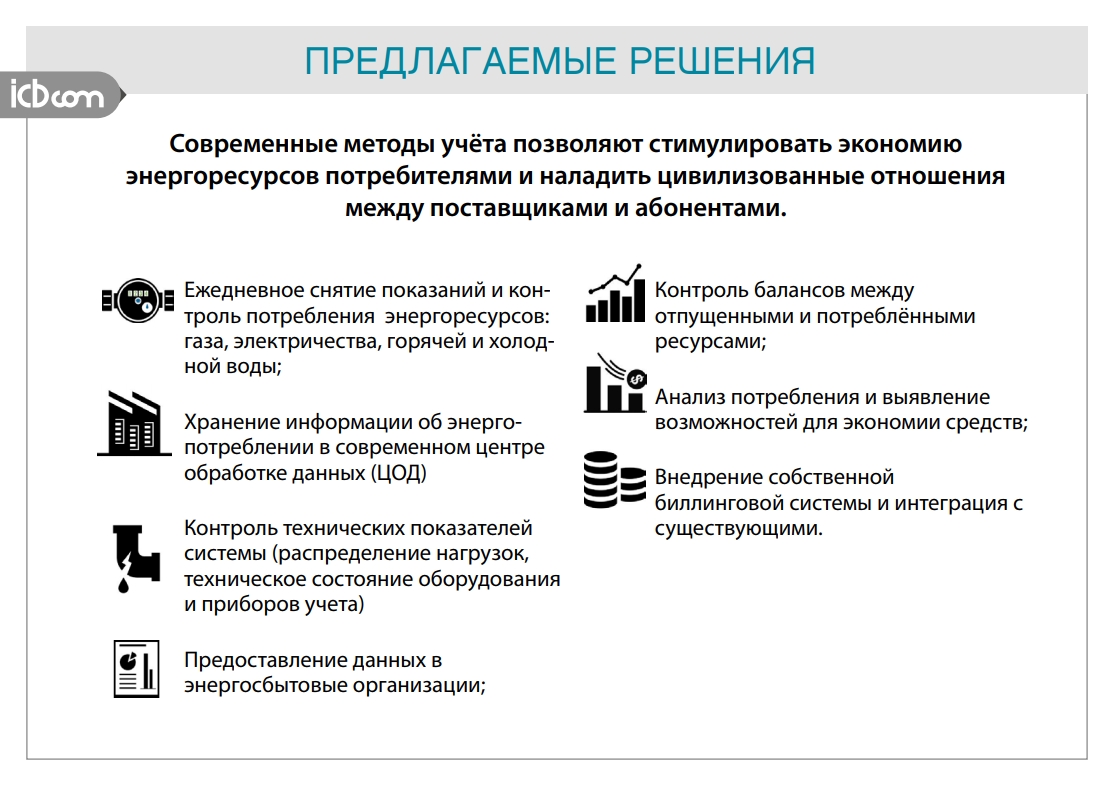
In China and Russia, serial meters are already being produced that can send readings over the network. There are also “add-ons”, which are mounted on conventional analog meters and allow them to be included in IoT systems.
Gas meter
module The ICBCOM communication module is combined with an ELSTER BK gas meter. It includes a processor, memory, and an optional communication module; it all runs on batteries. The module reads and transmits meter readings; There are options for devices with different transmission channels: LoRaWAN, TCP, UDP.
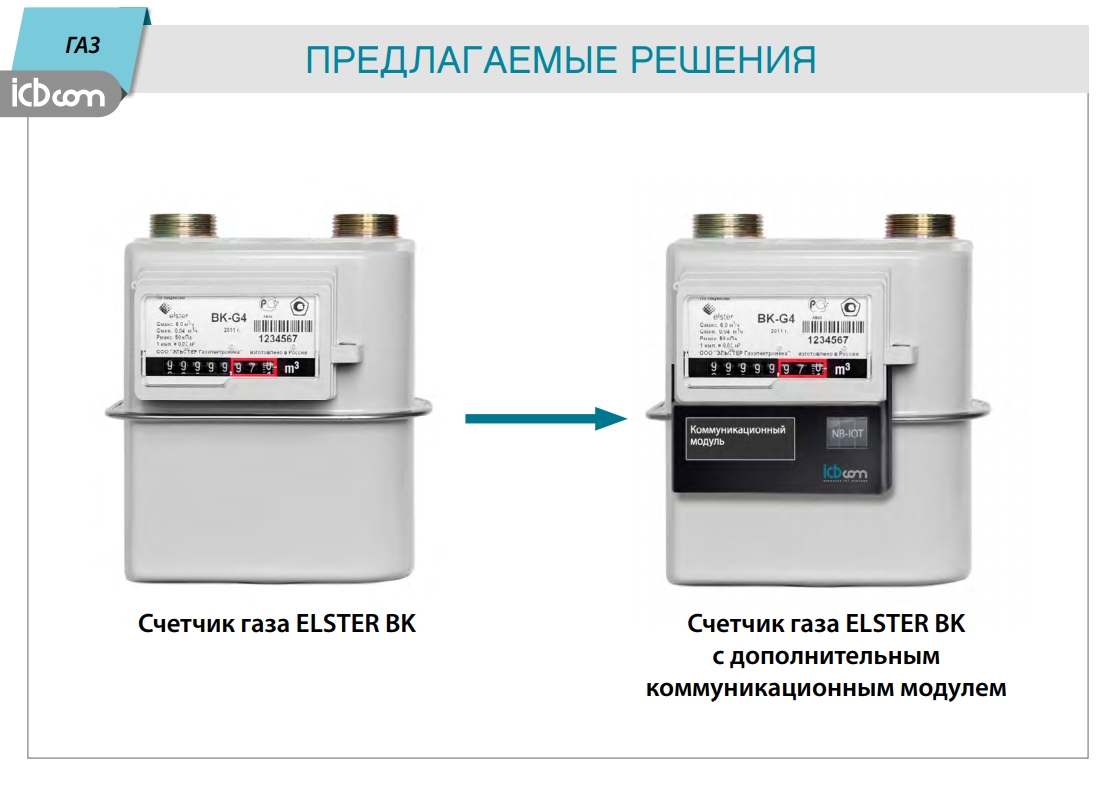
In China, the Gold Card is being manufactured - a smart gas meter with the NB-IoT communication module. With it, you can implement smart metering and remote monitoring. A small number of these devices are still entering the Russian market, because the frequencies at which its module operates are not allowed to operate in Russia.
Modules for water meters
To control the flow of water, you can install a smart cover on the meter. This is a device that has a built-in modem and a controller with communications.
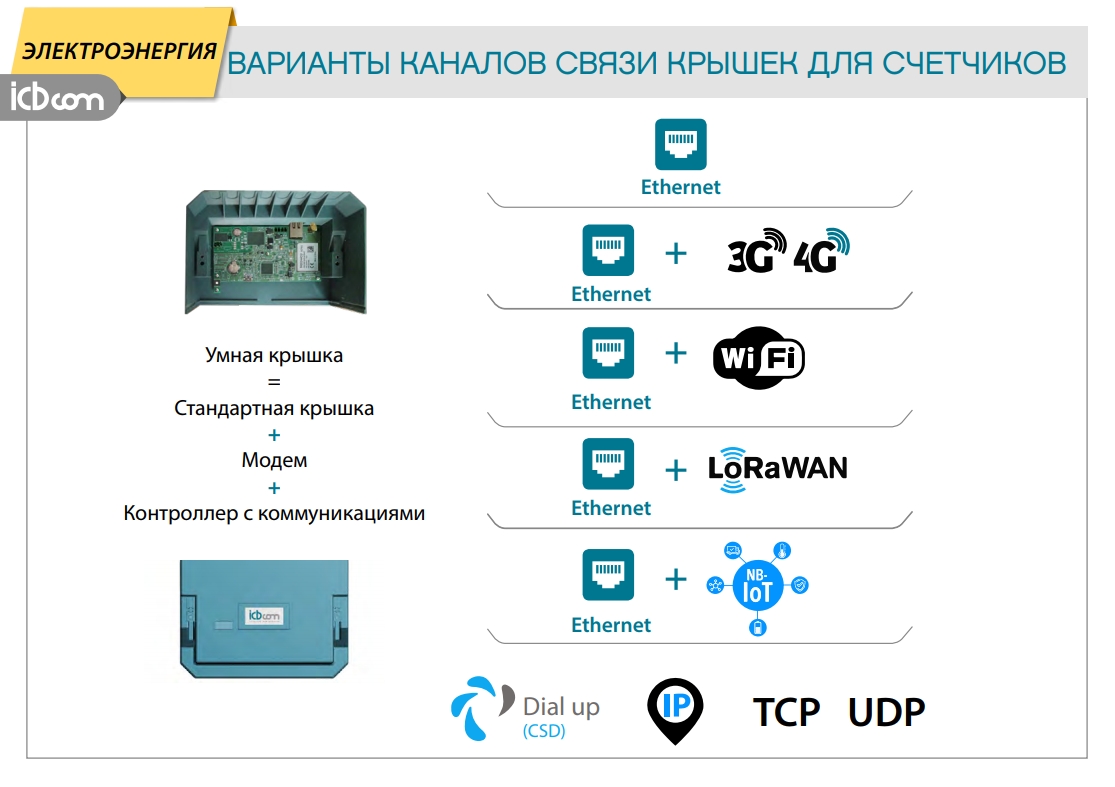
Electricity
meters Mercury meters are produced in Russia. Their readings can be read both from the device at the place of operation and remotely through various types of interfaces: for example, by connecting a GSM modem to the meter.
Replaceable modules are built in two-phase and three-phase counters "Stork". This allows you to use any communication channel (ETHERNET, WI-FI, GPRS, 3G, NB-IoT, LoRa) and easily change it if necessary. Thanks to the built-in triggers, the Aist power cut-off allows you to quickly disconnect from the network of non-payers. Counters are certified and brought in the state registry of the Russian Federation.

Which of the communication channels for counters is better? The large-scale introduction of LoRaWAN may in the future turn into serious infrastructure problems. The frequency band in Russia is very narrow, and if many companies use them, there will be a lot of competition. Therefore, IoT solutions on LoRaWAN in cities will simply stop working. To avoid this, it is necessary to allocate certain frequencies at the state level. Such a system is applied in Belarus to 4G frequencies: the state operator allocates frequencies and issues licenses for their use.
NB IoT has no such problem, therefore the potential of technology for the public sector is higher.
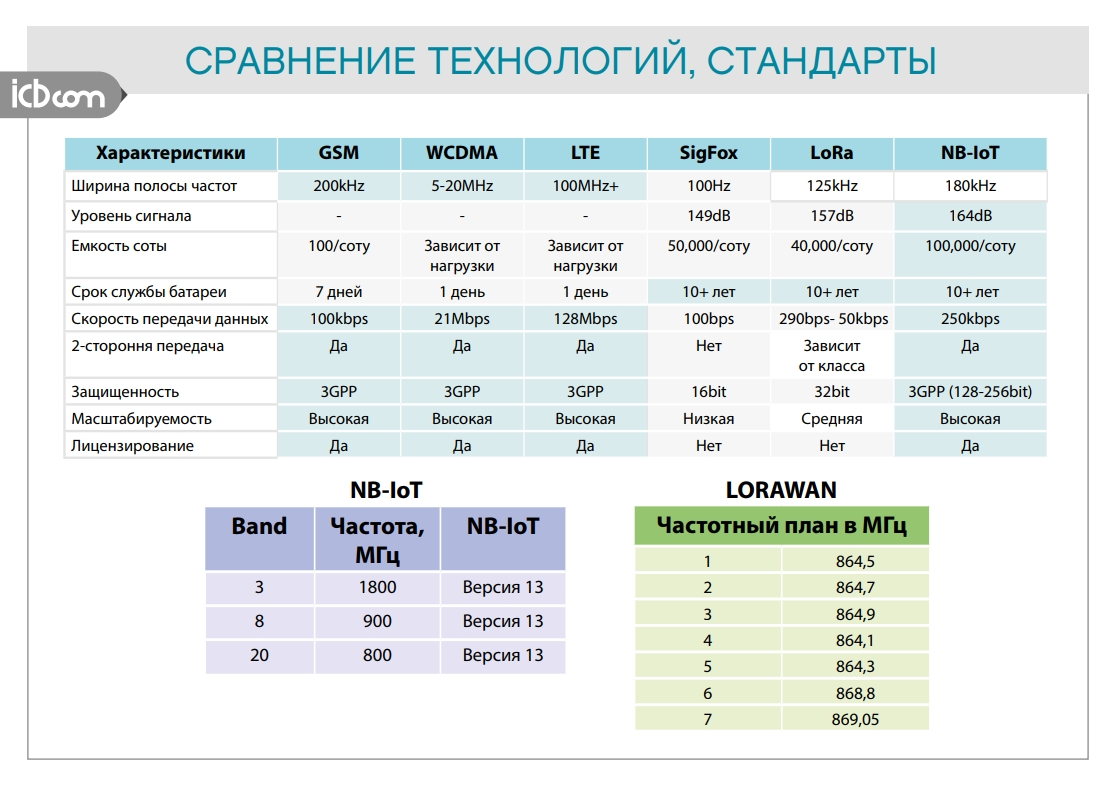
Management companies do not cope with the collection of data, and therefore do not need to force them to do this work. An option that will be convenient for everyone: the system is in the cloud, and data is collected by telecom operators. Participants in the housing and utilities system will take the place of users. Protocols must be applied for IoT; then it will be possible to introduce smart devices. Now a number of companies are developing platforms that can be used for such projects.
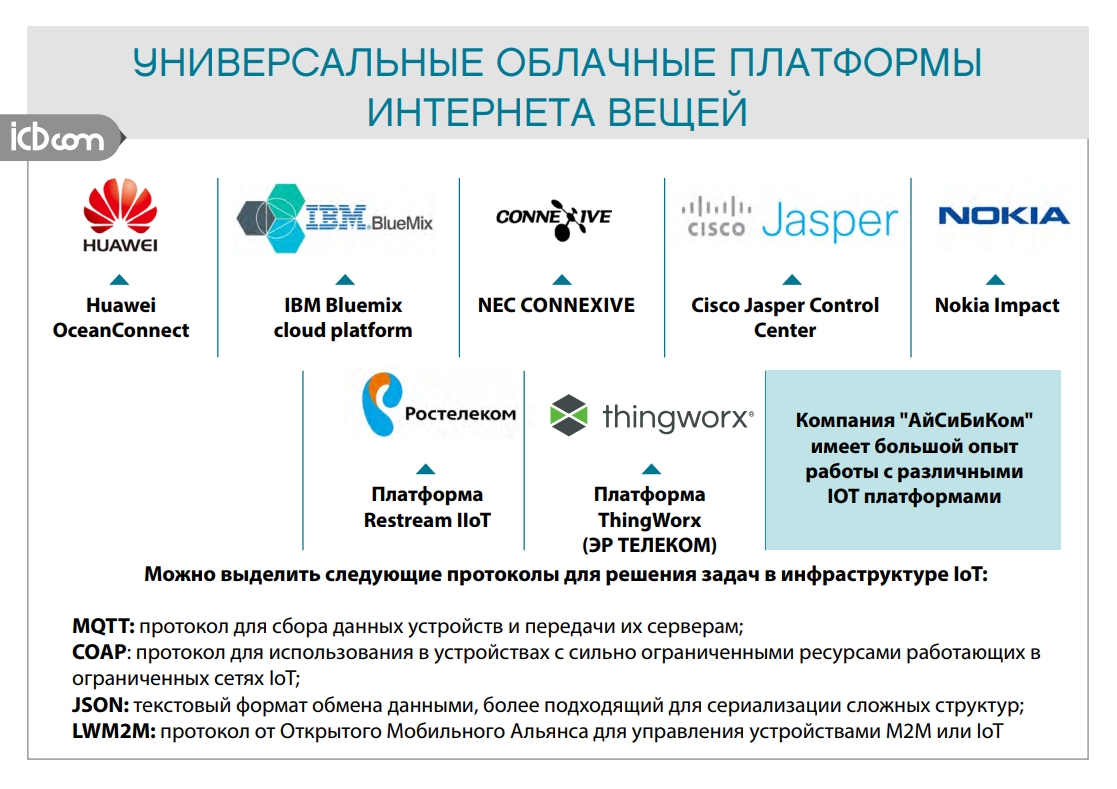
Here is what a working example of a platform for an energy-billing system might look like (collection of information on the use of services, their pricing, billing to subscribers, payment processing). It provides storage and processing of primary data; contains a server interface and embedded analytics technology.
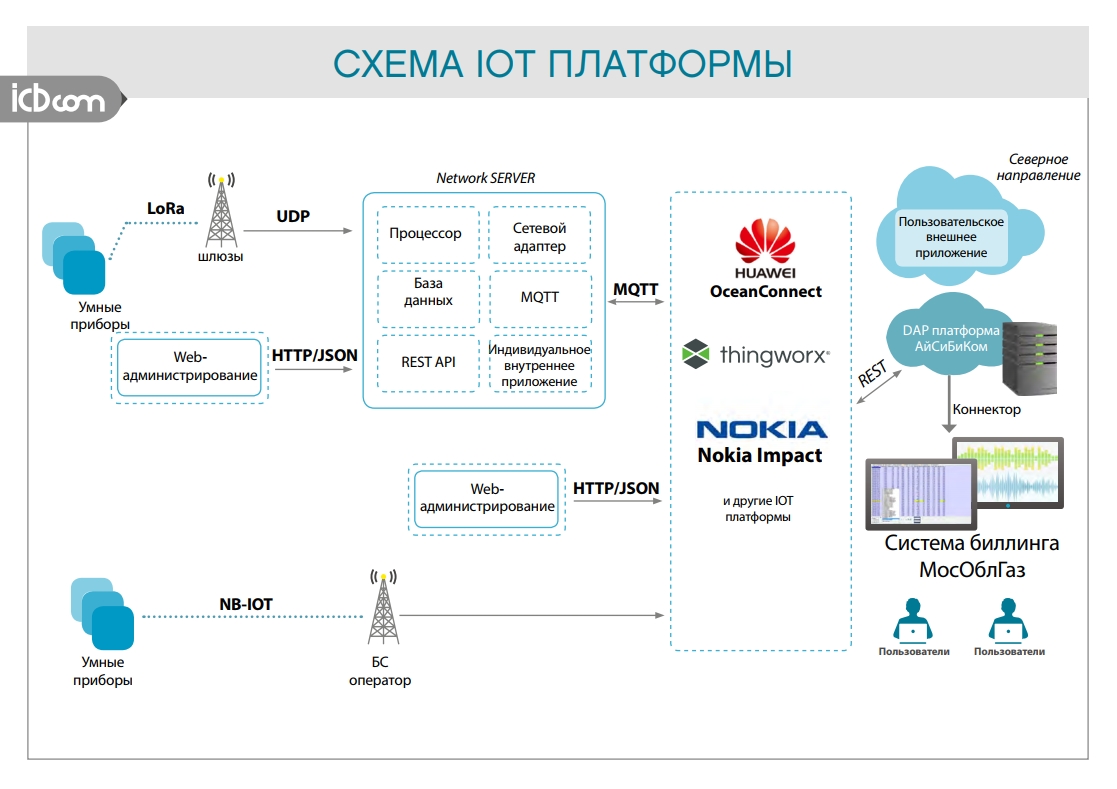
Ideally, all applications must be written inside the platform itself, it meets the modern requirements of convenience and cybersecurity. There are no such platforms yet: they are to be created by the era of mass introduction of smart meters.
This work can take the system based on the Internet of things. There are already models of smart meters that, with the necessary regularity, transmit their testimony to the Criminal Code. And users are helped daily to monitor their statistics on the consumption of public goods. How do they work and what are the difficulties in implementation? Oleg Lisyutenko, Head of ICBCOM, devoted his speech at the conference to these issuesInternet of Things . Under the cut - decoding his report.

Resource losses in the housing and utilities sector are 30–40% for electricity, 10–15% for water and up to 60% for gas. These are really huge numbers: for example, the company Mosoblgaz, which has more than 700 thousand customers, cannot get a positive plus, because half of the gas supplied by it is simply not paid. This happens because many people do not know how or do not want to log in to the personal account on the site every month and send meter readings. Does not work and the system of recording testimony through the receipt or by phone. Add here illegal connections and inevitable errors when taking and receiving testimony, and the picture becomes completely bleak. All this happens because companies are shifting testimony to users, but they do not at all crave to do it.
If the meters will send the readings themselves, automatically, this will solve the problem. What does the law say about smart meters?
IoT and law
In 2017, the Federal Law “On the Security of the Critical Information Infrastructure of the Russian Federation” dated July 26, 2017 No. 187-ФЗ. It says: "The means intended for detecting, preventing and eliminating the consequences of computer attacks <...> are cryptographic means of protection." At one of the housing and utilities conferences, a representative of the Ministry of Energy of the Russian Federation said that today all sites over 110 kilowatts are required to use cryptography.
What will be the data volumes in the housing and utilities sector and will they fall under the new standard? Ideally, meter readings should be taken daily. This is the only way to keep high-quality balance accounting, which is so lacking in modern utilities.
In 2019, we are waiting for new laws in the communal sphere. According to tassThe Ministry of Construction and Housing and Communal Services is developing a minimum standard for the digitization of urban economy in Russia. Probably, the new law will require remote data transmission by utilities and remote disconnection from debtors' networks. And, of course, the device must be able to independently update. However, public utilities have asked to postpone the adoption of the law until 2020, because now the industry does not know how to come to the digital era.
To comply with the new laws, top-level systems must appear that will meet all requirements and reliably protect data. But the industry is still not morally ready for such innovations.

What to do with "stupid" counters?
In China and Russia, serial meters are already being produced that can send readings over the network. There are also “add-ons”, which are mounted on conventional analog meters and allow them to be included in IoT systems.
Gas meter
module The ICBCOM communication module is combined with an ELSTER BK gas meter. It includes a processor, memory, and an optional communication module; it all runs on batteries. The module reads and transmits meter readings; There are options for devices with different transmission channels: LoRaWAN, TCP, UDP.

In China, the Gold Card is being manufactured - a smart gas meter with the NB-IoT communication module. With it, you can implement smart metering and remote monitoring. A small number of these devices are still entering the Russian market, because the frequencies at which its module operates are not allowed to operate in Russia.
Modules for water meters
To control the flow of water, you can install a smart cover on the meter. This is a device that has a built-in modem and a controller with communications.

Electricity
meters Mercury meters are produced in Russia. Their readings can be read both from the device at the place of operation and remotely through various types of interfaces: for example, by connecting a GSM modem to the meter.
Replaceable modules are built in two-phase and three-phase counters "Stork". This allows you to use any communication channel (ETHERNET, WI-FI, GPRS, 3G, NB-IoT, LoRa) and easily change it if necessary. Thanks to the built-in triggers, the Aist power cut-off allows you to quickly disconnect from the network of non-payers. Counters are certified and brought in the state registry of the Russian Federation.

LoRaWAN Anti NB IoT
Which of the communication channels for counters is better? The large-scale introduction of LoRaWAN may in the future turn into serious infrastructure problems. The frequency band in Russia is very narrow, and if many companies use them, there will be a lot of competition. Therefore, IoT solutions on LoRaWAN in cities will simply stop working. To avoid this, it is necessary to allocate certain frequencies at the state level. Such a system is applied in Belarus to 4G frequencies: the state operator allocates frequencies and issues licenses for their use.
NB IoT has no such problem, therefore the potential of technology for the public sector is higher.

Who should collect the data?
Management companies do not cope with the collection of data, and therefore do not need to force them to do this work. An option that will be convenient for everyone: the system is in the cloud, and data is collected by telecom operators. Participants in the housing and utilities system will take the place of users. Protocols must be applied for IoT; then it will be possible to introduce smart devices. Now a number of companies are developing platforms that can be used for such projects.

On this slide, the information is a bit outdated: Rostelecom is no longer implementing the IoT platform, and the Nokia solution has been transferred to MTS.
Here is what a working example of a platform for an energy-billing system might look like (collection of information on the use of services, their pricing, billing to subscribers, payment processing). It provides storage and processing of primary data; contains a server interface and embedded analytics technology.

Ideally, all applications must be written inside the platform itself, it meets the modern requirements of convenience and cybersecurity. There are no such platforms yet: they are to be created by the era of mass introduction of smart meters.
Moscow Conference on the Internet of Things passed, ahead - Kiev. At the conference on November 14, a separate block of reports will be devoted to IoT solutions in Ukraine.
